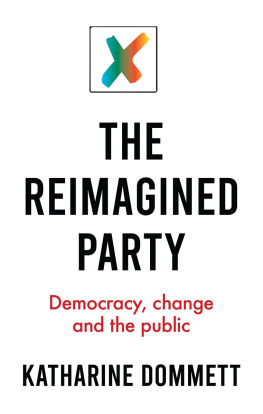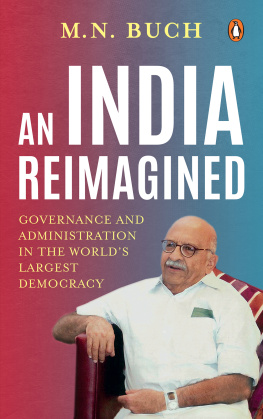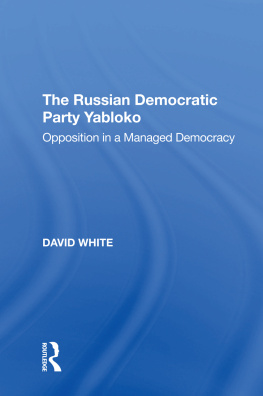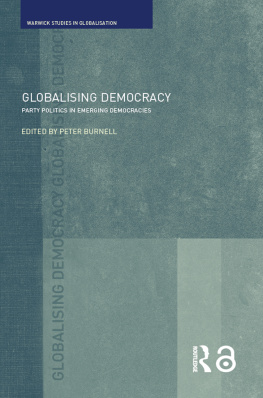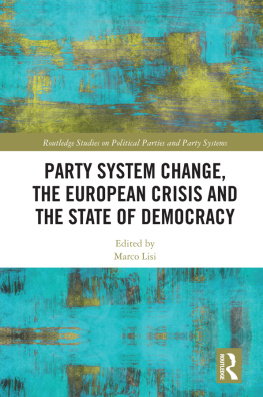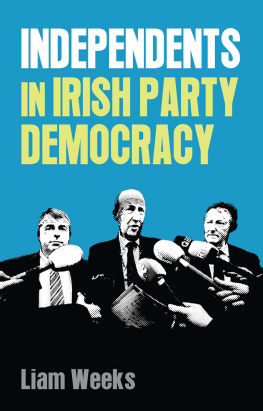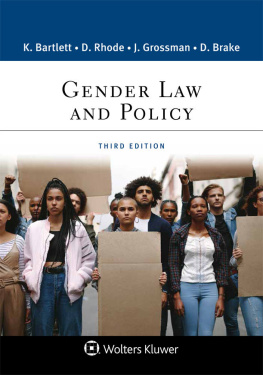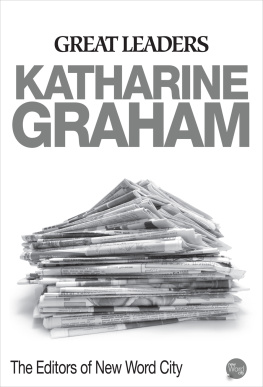The book is dedicated to the women who have informed my life. My mother, sister, grandmothers and aunts have been a powerful influence on my thinking, fuelling my curiosity and passion to write. They have given me the faith to find my own voice, and the courage to think about problems in a different way.
The reimagined party
Democracy, change and the public
Katharine Dommett
Manchester University Press
Copyright Katharine Dommett 2020
The right of Katharine Dommett to be identified as the author of this work has been asserted by her in accordance with the Copyright, Designs and Patents Act 1988.
Published by Manchester University Press
Altrincham Street, Manchester M1 7JA
www.manchesteruniversitypress.co.uk
British Library Cataloguing-in-Publication Data
A catalogue record for this book is available from the British Library
ISBN 978 1 5261 4751 6 hardback
ISBN 978 1 5261 4752 3 paperback
First published 2020
The publisher has no responsibility for the persistence or accuracy of URLs for any external or third-party internet websites referred to in this book, and does not guarantee that any content on such websites is, or will remain, accurate or appropriate.
Typeset in Baskerville and Myriad Pro
by R. J. Footring Ltd, Derby, UK
Contents
This book was forged of failure. After spending over a year and a half trying to write a book, I was forced to admit that the idea just didnt work. For any writer, the realisation that you simply dont have enough to say is difficult to face. And yet, in the grips of failure, I conceived a new project and idea that inspired this book. In this text, I hope to cast a new light on debates about political parties. Too often our discussions of party politics can be dominated by the events of the day and it is difficult to find the space to step back and consider how it is that we would like to see politics work. This book aims to facilitate such a debate, providing new insight into public views of parties by testing and exploring perceptions and desires in a range of different ways. The results show that, far from rejecting parties, these organisations are still valued, but there are areas where they do not live up to many citizens ideals.
The research and writing process has been supported by numerous individuals and by a lifetime of investment and support from family and friends. Particular thanks go to Luke Temple for his work on this research. His enthusiasm, patience and love of crisps have been a constant companion throughout the project. When I started this research my knowledge of statistics was fairly basic, and Luke has provided support throughout on quantitative methods. He helped to build the regression models presented in the appendix of this book and has made invaluable contributions to the analysis. We have co-authored a number of articles building on this work, and this book would not have been possible without his support, so I owe him a debt of thanks. The project has also been supported by a number of other people. I particularly want to thank Simon Burall, Sarah Allan and the staff at Involve for their work on the deliberative workshops, as well as Todd and Kristen Hartman, Robin Hughes, Indra Mangule and Alex Hastie. I also want to thank all the individuals who participated in the surveys and workshops conducted for this research.
I have also been fortunate to find an environment at Sheffield University in which thinking and research can thrive. I have been surrounded by friends and colleagues always eager to exchange ideas and unendingly generous in their time and support. I particularly want to thank Charles Pattie for his love of marginalia and invaluable critique, Colin Hay for his mentorship, Pat Seyd for his endless support and Andy Hindmoor for his advice. More broadly, I owe a debt of thanks to Clara Sandelind, Jonna Nyman, Sam Power, Warren Pearce, Tom Stafford, Ruth Blakeley, Holly Ryan, Holly Snaith, Brenton Prosser, James Weinberg, Nikki Soo, Liam Stanley and many others for innumerable discussions and distractions from this book. I would like also to thank the ERSC for funding this research, and acknowledge the support of grant ES/NO1667X/1.
Finally, I would like to thank my family for their investment and support. I owe a particular debt to my grandfather, who, with a twinkle in his eye, kept me constantly asking questions and striving to know more. I could also not have written this book without the unending support of my husband, James, whose generosity and patience are unparalleled.
Political parties are an established feature of contemporary democratic politics. For decades, parties have organised government, competed in elections and influenced the way society is run. Yet despite their importance, parties position in society is presently unclear. As has been documented over successive decades, there is wide-ranging evidence of discontent with traditional party politics, with mainstream parties witnessing declining popular support and being described in almost uniformly negative terms. But, simultaneously, there are also signs that the public have not entirely renounced party politics, with newer parties and unconventional party leaders achieving support and success. In such a climate it is not clear how citizens view political parties and what it is that people desire from these organisations.
In this book, I use a range of methods to explore what citizens ideally want from parties, and then probe how parties are currently seen to measure up to these desires. Given that many parties are seeking to generate public appeal through innovations such as the creation of registered supporters networks, the adoption of community organising principles and even the use of data mining, this book provides important insights into the kind of reforms that may be able to bring parties in line with citizen desires. Probing citizens views, I explore different influences upon public perceptions of parties in an attempt to determine what it is that citizens like and dislike, and where and how people would like to see parties change. To do so, I direct attention to the way parties represent, provide opportunities for participation, govern and conduct themselves. Through this analysis I demonstrate that there is no simple cure for parties, but neither is there a rejection of partisan politics; rather, what many people appear to desire is an expansive reimagination of the way that parties operate.
The reimagined party
The idea of a reimagined party captures the desire for a wide-ranging change in party politics. But it does not signal the rejection of established ideas of party democracy in favour of more technocratic or populist ideas. Rather, I argue that people want existing aspects of party politics such as aggregation and mediation, responsive and responsible governance, and partisan leadership to be performed in a slightly different way. People therefore call for more open and inclusive parties, ones that listen to different views but that also advance principled visions of the national interest. They want to see established principles of party democracy reimagined to reflect new norms and ideas.
To think about what this means, it is useful to consider an analogy from the car industry, where the idea of reimagined cars is often found. Car manufacturers frequently claim to reimagine classic car designs and models, drawing on the best from the past to create new models equipped with the latest mod cons. Take the example of the Mini, which was relaunched in 2001. Whilst the classic Mini had been successful in its day, for modern customers the car no longer had appeal. Although originally praised for its go-kart-like handling and simple interior and mechanics, these features and style were no longer viewed as desirable. In part this was due to technical functionality. The old Minis lacked air conditioning, heated seats and an efficient engine, meaning that most people with the exception of a number of classic car enthusiasts were unlikely to buy the car. But it wasnt just this there was also a sense that the feel of the car no longer chimed with modern buyers and that it wouldnt be enough to simply add integrated satnav or parking sensors to the old Mini body. What was required was a reimagining of the car that, recognising the growing popularity of SUVs and larger, safer cars, created a new Mini that was playful, practical and that, whilst recognisable as a Mini, was undoubtedly new. The new, reimagined Mini therefore did not just add new functions or change how existing features performed, but also signalled a step-change in how the car was viewed and felt to drive. Without these changes the Mini would have continued to wane, becoming the preserve of devoted classic car fans.


